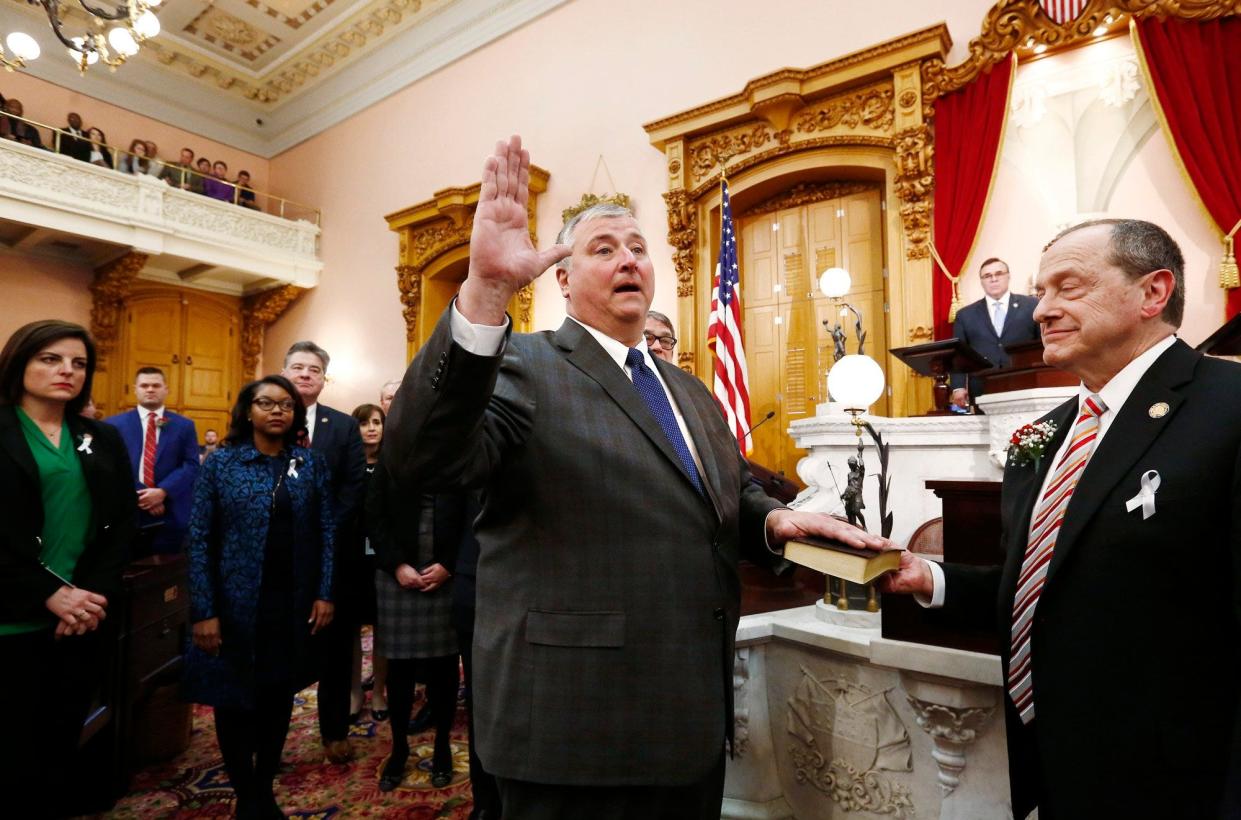Opinion: Let's be honest about bailout scandal that led to conviction of 'corrupt genesis'

- Oops!Something went wrong.Please try again later.
- Oops!Something went wrong.Please try again later.
Cheryl Roberto served as a commissioner on the Public Utilities Commission of Ohio from 2008-2012. She was also a member of the independent consulting team at Synapse Energy Economics retained by Illinois to review Exelon’s claims.
With the conviction of former Ohio House Speaker Larry Householder for racketeering conspiracy related to the $61 million in bribe money paid by FirstEnergy Corp in return for a $1.3 billion for its nuclear plants, it is timely to reflect on the harm resulting from this scandal and consider action to ameliorate it.
Despite its corrupt genesis, Gov. Mike DeWine was initially reluctant to support a repeal of the bailout and has since maintained that the bailout itself was good policy, supporting 1,500 Ohio nuclear plant jobs and keeping nuclear power in the energy mix.
But is that true?

When FirstEnergy Corp threatened to shutter its nuclear power plants unless it received a multi-year billion dollar plus bailout, Ohio legislators sprang to action to adopt the bill FirstEnergy officials themselves had crafted.
Neither the legislators nor the governor required FirstEnergy Corp to prove its need, diverting closer examination by trumpeting concerns of preserving the jobs and tax base that anchored the impacted Ohio communities.
More:FirstEnergy text messages say Lt. Gov. Husted pushed for more money for nuclear plants
In fact, Lt. Gov. Jon Husted pressed to make the bailout even bigger. Legislators camouflaged the impact of the new customer charges required to pay for the bailout by gutting energy efficiency and renewable energy programs that had successfully delivered millions in savings.
A different approach got better results.
Compare Ohio’s approach to the one Illinois took.
Exelon threatened to close nuclear plants in Illinois, eliminating 3,500 jobs, impacting $63 million in annual local taxes, and ceasing generation of 30 percent of Illinois carbon-free energy unless it received a subsidy.
Illinois Gov. J.B. Pritzker did not ask Exelon what it wanted.
He demanded that Exelon demonstrate what it needed.
His administration hired an independent firm to analyze Exelon’s claims that it would be forced to close plants. The subsequent report acknowledged that two of Exelon’s nuclear plants faced a real risk of becoming uneconomic in the near term, that Illinois could reasonably determine that it is in the public interest for the plants to remain in operation, warranting public support.
However, such support should only be provided when it was demonstrably required and only after a transparent, annual process. With this information in hand, Pritzker negotiated and signed the resulting bi-partisan comprehensive energy legislation.
While this 900-page piece of legislation is too big to summarize here, three elements are relevant and worth mention.
First, it included a financial safety net for the nuclear plants that only provided a subsidy when it was needed; and importantly shared any upside with customers when the plants did well.
Second, it expanded energy efficiency programming.
And third, it expanded ethics reform directly targeting utility company behavior.
In Ohio, because of the scandal, the House Bill 6 subsidy was reversed, and those plants did not receive the bailout; yet remain operational, calling into question the need for a bailout after all.
Under the policy design in Illinois, the plants also remain operational, but Commonwealth Edison customers are receiving an average bill credit of $237 per year from the utility. In future years, customers are likely to see a continuation of this credit because financial support was designed as a safety net, sharing both the risk and reward of nuclear plant operation.
While in Ohio customers have been deprived of a projected $890 million dollars of energy efficiency savings annually and no utility ethics reform has manifested, Illinois customers are able to participate in robust energy efficiency programs and utilities must now conform to strict ethical requirements.
Ohioans deserve an energy policy that improves our lives; not one designed by corrupt politicians and aided by the unwitting officials who are unquestioningly willing to enrich utility investors and their executives with cash from customers’ wallets.
It isn’t too late for DeWine, Husted and the legislators to step up.
Cheryl Roberto served as a commissioner on the Public Utilities Commission of Ohio from 2008-2012. She was also a member of the independent consulting team at Synapse Energy Economics retained by Illinois to review Exelon’s claims.
This article originally appeared on The Columbus Dispatch: Opinion: Was bailout at center of Larry Householder conviction needed?

